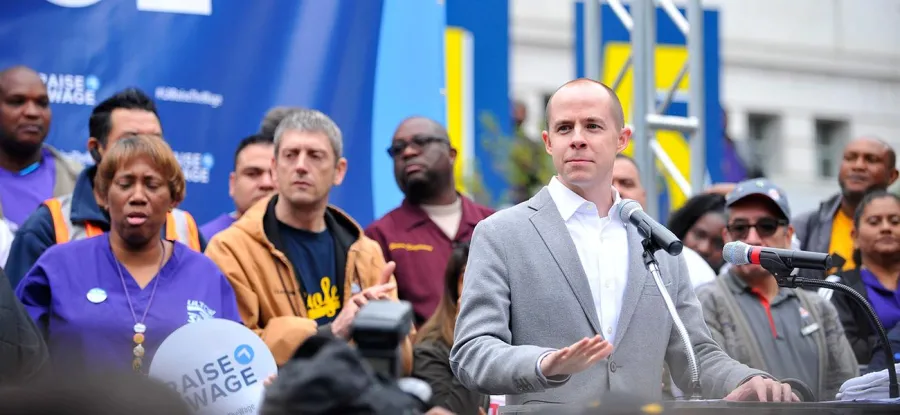California Democratic Party elects L.A. labor leader Rusty Hicks as chairman

Labor leader Rusty Hicks was elected the next chairman of the California Democratic Party on Saturday, a win cemented by support from many elected officials and most of the state’s major labor organizations, who hope he can steer the party out of an internal crisis in time for the 2020 elections.
Hicks, president of the Los Angeles County Federation of Labor, bested Bay Area activist Kimberly Ellis, who finished in second place, to succeed former party Chairman Eric Bauman, who resigned last year after facing a series of sexual harassment allegations.
With 3,162 votes counted, Hicks dominated with 57% of the vote. Ellis, who lost to Bauman by just a few dozen votes in 2017, received 36% of votes, and Daraka Larimore-Hall, the party’s vice chairman, trailed with just 6%.
Hicks said in a statement that he expected the race to come to a runoff and that he is “humbled” by the outcome.
“I believe that the positive nature of our respective campaigns has been and will prove to be a positive step to a bigger, better, stronger Democratic Party,” he said.
Supporters said Hicks’ victory is the first step toward stabilizing the party, preparing it for the March presidential primary and to help oust President Trump.
“There’s a deep breath of relief from Democrats who are happy that the party is going to be in good hands and have a strong chair that can help fulfill the party duties,” said Doug Herman, a Democratic consultant who was supporting Hicks. “It’s a direct reflection of the fact that Rusty represented stability and the course that the party delegates were looking for and that the party needs.”
Hicks, 39, has been praised by his backers as a skilled political strategist and a steady, even-keeled leader in the labor movement. A native of Texas, he served as political director for the Los Angeles County Federation of Labor under Maria Elena Durazo, rising to president after she was elected to the state Senate in 2018.
But supporters of Ellis, who would have been the first woman to lead the state party in more than 30 years and the first black woman to chair the organization, say the vote represents a missed opportunity for the party to show it takes new voices and issues of representation seriously.
Dallas Fowler, a delegate from Los Angeles, said Ellis’ candidacy was a chance to make history and elect a capable leader committed to opening the party up to more women, young people and people of color.
“If I, as a young black woman in this party, can’t see myself in leadership, then what’s the point?” Fowler said. “This is a majority-minority state, and until our party really shows up and puts our money and our time and our muscle behind these communities to ensure that we have adequate representation, we’re not going to see that.”
Hicks’ victory comes on the heels of a contentious campaign that centered on how best to steer the party forward after months of turmoil.
In November, after several state party staff members and activists accused Bauman of unwanted touching and making crude sexual comments, the then-chairman resigned. The state party now faces three lawsuits alleging discrimination and retaliation in addition to allegations that party leaders ignored Bauman’s alleged misconduct.
Ellis burst onto California’s political scene in 2017 when she narrowly lost the chairmanship to Bauman. At the time, Bauman was chair of the Los Angeles Democratic Party, vice chair of the state party and had the support of many of the state’s top Democratic leaders.
Ellis’ political cachet and connections to top California Democrats rose steadily during her years as director of Emerge California, a nonprofit devoted to electing more women to office. Though she backed former Secretary of State Hillary Clinton in the 2016 Democratic presidential primary, Ellis gained the support of the progressive wing of the state party, appealing to supporters of Vermont Sen. Bernie Sanders in her first run for chair.
In this year’s contest, Ellis’ support of publicly financed elections raised concerns among state Democratic leaders that she would further limit corporate donors or ban them altogether, a move that could handicap the party financially.
“If we don’t have a supermajority or a majority, then that puts our policies at peril,” said Kevin de León, who was Democratic leader of the state Senate when Ellis narrowly lost her first race. De León said he “had some concerns” two years ago about Ellis and decided to endorse Hicks, a longtime friend, in this year’s race, adding that he called delegates to lobby them to support Hicks.
“We must always have the utmost confidence in whoever is the leader of the California Democratic Party,” De León said.